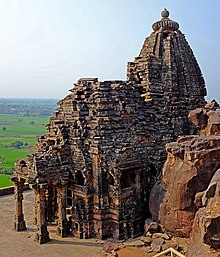Vidisha is considered to be Puranakshetras Jain tirtha. The Jain temples are located in Vidisha district in state of Madhya Pradesh, India. According to Jain belief, Vidisha is the birthplace of Shitalanatha, the tenth tirthankar. Here the first 108 feet elevated temple with all Tirthankaras with Shitalanatha as the principal deity is under construction.[1]
| Jain temples, Vidisha | |
|---|---|
 Maladevi temple | |
| Religion | |
| Affiliation | Jainism |
| Deity | Tirthankar |
| Festivals | Mahavir Jayanti |
| Location | |
| Location | Vidisha, Madhya Pradesh |
| Geographic coordinates | 23°39′32.1″N 78°06′49.1″E / 23.658917°N 78.113639°E |
| Architecture | |
| Style | Gupta, Māru-Gurjara, Mughal |
| Creator | Gupta, Pratihara dynasty |
| Date established | 4th to 5th century |
| Completed | 10th century |
| Temple(s) | 14 + 1 cave |
Jain cave
editAccording to Jain belief, Vidisha is one of the first places where the Jain images were worshipped. The earliest of these are two Jain caves of Udayagiri. Only a torso remains of one cave, and this torso is now exhibited in an open-air museum.[2]
Cave 20 is the only cave in the Udayagiri Caves complex is dedicated to Jainism. It is on the northwestern edge of the hills. At the entrance is the image of the Jain Tirthankara Parshvanatha sitting under a serpent hood. The cave is divided into five rectangular rooms with stones stacked, the total length of 50 feet (15 m) that is about 16 feet (4.9 m) deep.[3]
Jain temples
editBada Mandir
editBada Mandir is one of the fourteen Jain temples present in Vidisha. The temple is built in Mughal architecture. The bada mandir consists of a miraculous Jain idol which is considered to be older than the temple.[2]
Bajramath Jain temple
editBajramath Jain temple is situated in Gyaraspur and dates back to the 9th century. This temple enshrines three garbhagrihas with the temple is fully decorated with Jain sculptures.[4] The temple was earlier a Brahmical temple dedicate to Surya but was transformed to a Jain temple.[5] All three shrines of this temple are now occupied with idols of tirthankaras.[6][7]
Maladevi temple
editMaladevi temple dates back to the 9th century. This is a rock-cut temple built in Pratihara style. The temple was initially a Brahmical temple but later converted to a Jain worship site. The temple is dedicated to Adinatha.[8][9] The Maladevi temple is considered one of the best examples of its collection of varied Jain sculptures.[10]
Gadarmal Devi temple
editGadarmal Devi temple dates back to the 9th century. The architecture of this yogini temple is a fusion of Pratihara and Parmara styles. It is built similar to Teli ka Mandir in Gwalior fort. This temple houses both Hindu and Jain idols.[11] The temple is made of sandstone with seven small shrines surrounding the main shrine.[12]
Pathari Jain temples
editPataria Jain temples was built in the 9th century in Badoh city. These are a cluster of 25 temples with the main shrine surmounted with shikharas; the other shrines have a flat roof, shikharas, and dome.[13][14]
Restoration
editIn 1930, Gwalior state stepped up to conserve Maladevi temple.[15] All of the monuments in Vidisha are protected by Archaeological Survey of India.[16]
Gallery
edit-
Pataria Jain temple
-
Bajramath Jain temple
-
Carvings of Vishnu on wall of Bajramath Jain temple
-
Image of Adinatha inside Bajramath Jain temple
See also
editReferences
editCitations
edit- ^ Dainik Bhaskar & 108 feet temple.
- ^ a b Titze & Bruhn 1998, p. 13.
- ^ Cunningham 1880, pp. 53–54.
- ^ ASI & Bajramath Temple.
- ^ Mitra 2010, p. 77.
- ^ Ayyar 1987, p. 16.
- ^ Mitra 2012, p. 24.
- ^ Mitra 2010, p. 76.
- ^ Mitra 2012, p. 23.
- ^ Ghurye 2005, p. 39.
- ^ ASI & Gadarmal Temple.
- ^ Mitra 2012, p. 26.
- ^ Jain 1972, p. 431.
- ^ ASI & Badoh Jain Temple.
- ^ Kumar 2010.
- ^ ASI & Vidisha.
Sources
edit- Cunningham, Alexander (1880). Report of Tours Bundelkhand and Malwa 1874–1875 and 1876–1877, Archaeological Survey of India, Vol. 10. ASI, Government of India.
This article incorporates text from this source, which is in the public domain.
- Titze, Kurt; Bruhn, Klaus (1998). Jainism: A Pictorial Guide to the Religion of Non-Violence (2 ed.). Motilal Banarsidass. ISBN 81-208-1534-3.
- Ayyar, Sulochana (1987). Costumes and Ornaments as Depicted in the Sculptures of Gwalior Museum. Mittal Publications. ISBN 9788170990024.
- Mitra, Swati (2010). Buddhist Circuit in Central India: Sanchi, Satdhara, Sonari, Andher. Goodearth Publications. ISBN 9789380262055.
- Ghurye, G.S. (2005). Rajput Architecture. Popular Prakashan. ISBN 9788171544462.
- Mitra, Swati (2012). Temples of Madhya Pradesh (1 ed.). Goodearth Publications. ISBN 9789380262499.
- Jain, Kailash Chand (1972). Malwa Through The Ages. Motilal Banarsidass. ISBN 9788120808249.
- Kumar, Arjun (20 October 2010). "Gyaraspur a small town which takes you back in time". India Times. Retrieved 3 August 2019.
- "Maladevi Temple". Archaeological Survey of India.
- "Bajramath Temple". Archaeological Survey of India.
- "Gadarmal Temple". Archaeological Survey of India.
- "Badoh Jain Temple". Archaeological Survey of India.
- "Vidisha". Archaeological Survey of India.
- "Vidisha, the country's first 108 feet elevated temple with all Tirthankars". Dainik Bhaskar. 17 April 2019. Retrieved 28 July 2019.